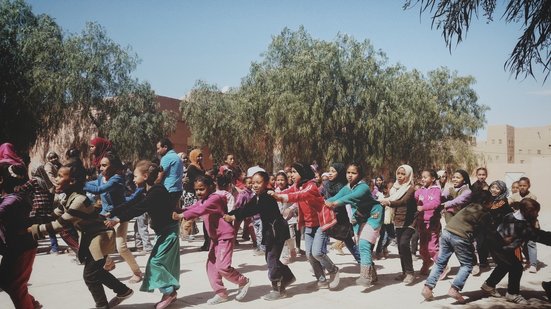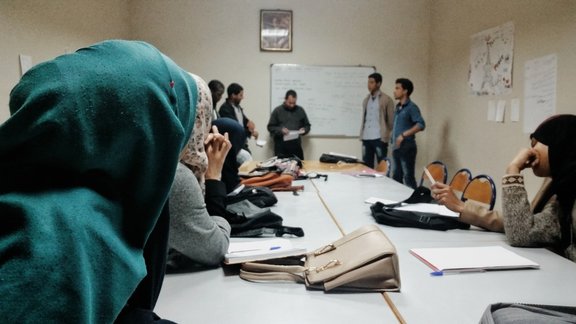Photo: Adriana Curto
Your new job
 Photo: Matt Rogers
Photo: Matt Rogers
Currently, every PCV in Morocco is working within the Youth Development (YD) sector. The aim of Volunteers is to help youth transition to become product, civically engaged adults by focusing their projects on three objectives:
1. Strengthen the life skills of youth
2. Build the capacity of youth to engage in their communities
3. Increase the ability of youth to communicate in English
Most Volunteers hold regular English classes or clubs during their first year of service, and some continue teaching English for the remainder of their service. English classes and clubs are a great way to build relationships and trust with youth early on. It also shows that you’re interested in learning their language just as much as they’re learning yours.
Eventually, you can expand your work into virtually anything you want, often by organizing clubs around topics like life skills, volunteerism, theater, health, STEM, yoga, sports, or anything you feel comfortable doing. With the support of Peace Corps you will identify a Moroccan counterpart who can teach, organize, and plan with you. While your students are learning, your counterpart will be too! As your counterparts develop new skills, they will be able to lead classes or clubs of their own.
You may also help plan and organize camps in coordination with counterparts or assist with camps that occur at local institutions during school breaks. Some camps may be day camps and others multi-week overnight camps. You may be responsible for running one activity a day or responsible for co-planning and co-facilitating an entire camp.
Below is the new Youth Development framework in Morocco that defines the work that Volunteers do. As described above, it includes a wide range of possibilities from informally mentoring youth to hosting classes, camps, and clubs of varying topics.
1. Strengthen the life skills of youth
2. Build the capacity of youth to engage in their communities
3. Increase the ability of youth to communicate in English
Most Volunteers hold regular English classes or clubs during their first year of service, and some continue teaching English for the remainder of their service. English classes and clubs are a great way to build relationships and trust with youth early on. It also shows that you’re interested in learning their language just as much as they’re learning yours.
Eventually, you can expand your work into virtually anything you want, often by organizing clubs around topics like life skills, volunteerism, theater, health, STEM, yoga, sports, or anything you feel comfortable doing. With the support of Peace Corps you will identify a Moroccan counterpart who can teach, organize, and plan with you. While your students are learning, your counterpart will be too! As your counterparts develop new skills, they will be able to lead classes or clubs of their own.
You may also help plan and organize camps in coordination with counterparts or assist with camps that occur at local institutions during school breaks. Some camps may be day camps and others multi-week overnight camps. You may be responsible for running one activity a day or responsible for co-planning and co-facilitating an entire camp.
Below is the new Youth Development framework in Morocco that defines the work that Volunteers do. As described above, it includes a wide range of possibilities from informally mentoring youth to hosting classes, camps, and clubs of varying topics.
Your browser does not support viewing this document. Click here to download the document.
Places of work
Volunteers are typically assigned to a youth center, women's center, school dormitory, or youth association. Throughout service, Volunteers may end up working solely with one organization or spread their work to multiple work sites. Here’s a description of Volunteer workplaces in Morocco:
- Volunteers are most often assigned to dar chebabs (youth centers), which have resources that range from physical spaces like classrooms to having resources like computers, instruments, auditoriums, and libraries.
- Nadi neswis (women’s centers) are typically places where women can develop professional and literacy skills. They typically have vocational classes such as cooking and sewing, along with preschool facilities for mothers to bring their children while they work or study.
- Dar talibs (for boys) and dar talibas (for girls) are boarding schools or dormitories. They exist to help students in rural areas who would otherwise have to travel long distances to and from school.
- Sports centers, which are more common in larger sites, offer a great venue for Volunteers interested in sports-related projects.
- Associations, which often work in tandem with the workplaces above, are the Moroccan version of nonprofits or NGO’s in the United States. They are registered with the government but operate independently. Like NGO’s, each association will have its own focus, be it health, micro-finance, youth development, theater, special needs, music, sports, politics, and everything else you can imagine.
- Schools are accessible to Volunteers only in some sites with the support of regional managers and are a great place to reach a large number of youth at once.
podcasts and Blogs
27 Months
RPCV David McDonald (2012-2014) brings you a 10-part podcast/audio documentary that tells what service is really like as a Peace Corps Morocco Volunteer. Listen and download here.
Morocco PCV Podcast
RPCV Mathew Crichton (2016-2018) interviews other current volunteers. Get to know more about Morocco R/PCVs by listening and downloading here.
A full list of Volunteer blogs, podcasts, and vlogs can be found here!
RPCV David McDonald (2012-2014) brings you a 10-part podcast/audio documentary that tells what service is really like as a Peace Corps Morocco Volunteer. Listen and download here.
Morocco PCV Podcast
RPCV Mathew Crichton (2016-2018) interviews other current volunteers. Get to know more about Morocco R/PCVs by listening and downloading here.
A full list of Volunteer blogs, podcasts, and vlogs can be found here!
